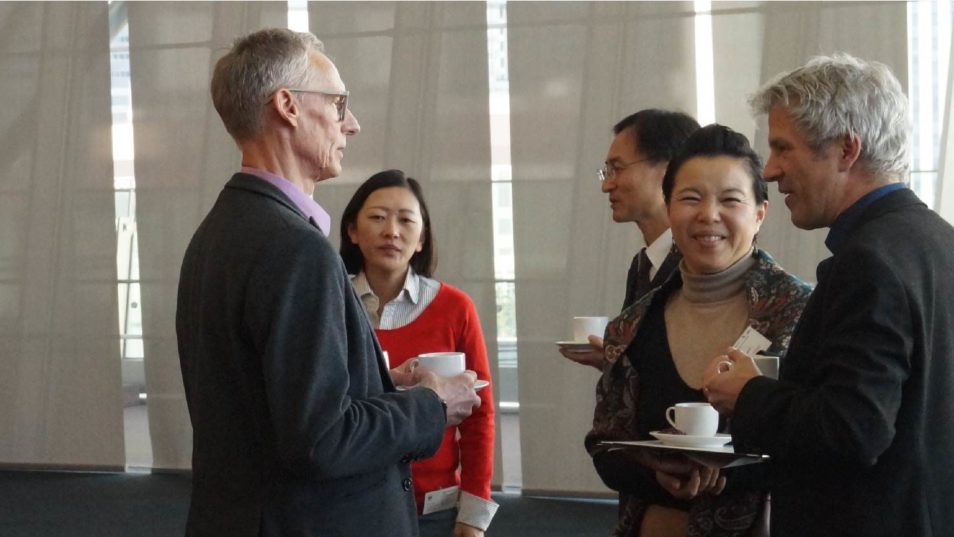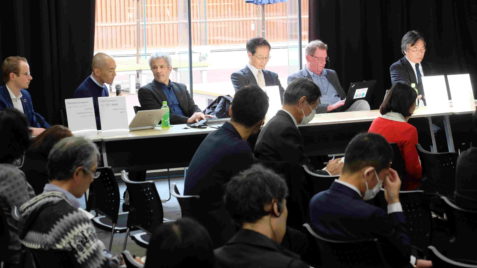Energy Transition in Japan and Germany - Policies, Perceptions, and Practices
 © DWIH/Sofinowski
© DWIH/Sofinowski
On February 17, Heidelberg University Office Kyoto (HUOK) and DWIH Tokyo welcomed about 50 participants to an international mini symposium on energy transitions organised in connection to the ongoing exhibition “energie.wenden” (energy transitions) on Odaiba in Tokyo.
The symposium was held at Miraikan (The National Museum of Emerging Science and Innovation) and hosted six speakers from engineering, economic and policy science backgrounds who discussed policies, perceptions and practices of energy transitions in both Japan and Germany.
The first session took the participants from the broad view of “national drivers and barriers to energy transitions”, presented by Maximilian Jungmann (Heidelberg University), via the question of “How do energy transitions deviate from historical technology trends”, presented by Prof. Dr. Yamaguchi Yohei (Osaka University) down to the fine print of “The role of households in energy transitions” presented by Prof. Dr. Timo Goeschl (Heidelberg University). The first presentation lead the spectators into the world of politics and made special mention of the UN’s sustainable development goals, which are both interconnected with one another as well as with taking the decisive steps towards a significant use of renewable energies. Prof. Dr. Yamaguchi then introduced the listeners to a simulation model which revealed possibilities of change in home construction. He explained how the energy transitions become measurable and that our perceptions do play a role in the successful pursuit of such transitions, past or present. Prof. Dr. Goeschl continued with the question on homes and households, arguing that these present a ‘black box’ that is notoriously hard for scientists to open. He also presented the results of a case in Maryland where a group succeeded in opening this ‘black box’, which lead to a measurable reduction in energy costs for households participating in the project.

The second session – following a short breather and lively mingling amongst the listeners and presenters alike – recommenced with presentations of specific examples. The first presenter was Prof. Dr. Ishihara Keiichi (Kyoto University) who presented on “The role of Electric Vehicles (EV) to promote Photovoltaic (PV) installation in Kyushu”. Prof. Dr. Ishihara showed the great success of photovoltaic in Kyushu, but also the increasing need for storage devices.
However, the increasing introduction of electric vehicles may be a solution. The following presenter was Prof. Dr. Klaus Pfeilsticker (Heidelberg University). He displayed examples for “Local energy concepts, based on savings, energy sufficiency and renewable energies”. His presentation clearly explained the need to understand basic physics and showed examples of how even buildings of considerable age can be renovated to become sustainable and more cost effective. Prof. Dr. Tsuchiya Noriyoshi rounded the second session off with his presentation on “Creating novel values around energy and geothermal energy in Japan”. Prof. Dr. Noriyoshi’s special inside showed how Japanese companies have become the most knowledgeable in utilising geothermal energy, which contrasted drastically with the lack of use of such energy in Japan. His presentation was a formidable plea in favour of geothermal energy and showed society’s need to rethink its values surrounding energy production.
The open Q&A session lead the panellists to consider and discuss differences in both countries education system and how it affects people’s knowledge about energy transitions. Other questions concerned nuclear power and Germany’s rapid end of both coal and nuclear energy.
Text: Jan Robin Sofinowski (DWIH Tokyo intern)
